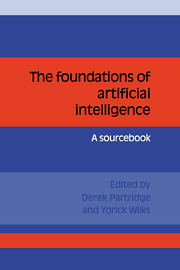Book contents
- Frontmatter
- Contents
- List of contributors
- Preface
- Acknowledgments
- 1 Introduction
- 2 The formal foundations of AI
- 3 Levels of theory
- 4 Programs and theories
- 5 The role of representations
- 6 The role of programs in AI
- 7 Rational reconstruction as an AI methodology
- 8 Is AI special in regard to its methodology?
- 9 Does connectionism provide a new paradigm for AI?
- 10 The role of correctness in AI
- 11 Limitations on current AI technology
- 12 Annotated bibliography on the foundations of AI
- Index of names
3 - Levels of theory
Published online by Cambridge University Press: 03 May 2010
- Frontmatter
- Contents
- List of contributors
- Preface
- Acknowledgments
- 1 Introduction
- 2 The formal foundations of AI
- 3 Levels of theory
- 4 Programs and theories
- 5 The role of representations
- 6 The role of programs in AI
- 7 Rational reconstruction as an AI methodology
- 8 Is AI special in regard to its methodology?
- 9 Does connectionism provide a new paradigm for AI?
- 10 The role of correctness in AI
- 11 Limitations on current AI technology
- 12 Annotated bibliography on the foundations of AI
- Index of names
Summary
One of the important complexities that confounds many discussions of AI is its claims to be a science, and the significance of AI programs is that the constituent phenomena can be represented, explored, refuted, and supported, etc. at many different, but not obviously separable, levels. Is theorizing in AI carried forward primarily by building and observing the behavior of models, or should we have a complete, formal specification prior to modeling, with the model providing merely an existence proof of practical viability? Advocates can be found for both sides of this methodological argument, which is taken up again, from other viewpoints, in subsequent sections.
Marr's paper argues for caution in “explaining” phenomena in terms of a working program (a Type 2 theory in Marr's terminology). This level of theory, embodying as it does a “mound of small administrative decisions that are inevitable whenever a concrete program is designed,” can all too easily obscure and hide some simple, abstract theory (a Type 1 theory) that may underlie it. He concludes that exploration at the program level should continue, but we must be careful not to overvalue results at this methodological level: “in the present state of the art [in AI], it seems wiser to concentrate on problems that probably have Type 1 solutions, rather than on those that are almost certainly of Type 2.” Marr, like Hoare and Dijkstra (see Partridge and Wilks paper in section 10), is suggesting that we limit AI research, initially at least.
Information
- Type
- Chapter
- Information
- The Foundations of Artificial IntelligenceA Sourcebook, pp. 95 - 96Publisher: Cambridge University PressPrint publication year: 1990
